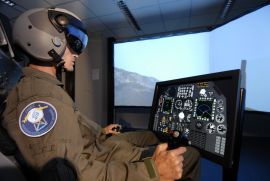 Start of the first verification and validation expertise centre for models, simulations and serious games
Start of the first verification and validation expertise centre for models, simulations and serious games
On Tuesday, October 30, the National Aerospace Laboratory (NLR) and TNO are opening ‘Q-tility’, a verification and validation (V&V) expertise centre for simulation developers and users. This centre of expertise aims for an improved quality of simulations, models and serious games, which in turn will allow simulation developers and users to improve their returns on investments and to better control risks.
Models, simulations and serious games are much more effective, affordable and safer to use than real systems, such as trainings, analyses, tests and research. Within the Dutch government, models, simulations and serious games play an important role in the training of military personnel and in preparations for crisis situations, such as terrorism and environmental disasters. Simulations are almost always an approximation of reality. If the quality of these methods is insufficient, this can lead to errors and oversights, which can potentially have severe consequences for operational management, safety, the economy or the environment.
Q-tility offers appropriate and affordable verification and validation solutions with which the quality and risks of simulations and their usage can be mapped in a structured and fundamental manner. In Q-tility, NLR and TNO combine their existing knowledge and know-how in the area of V&V. Their V&V knowledge and know-how have been partially developed by order of the Ministry of Defense and serve as the foundation of a new NATO standard. The Ministry of Defense is the ‘launching customer’ of the V&V expertise center and aims to act as a more efficient ‘smart-buyer/specifier/user’ of models, simulations and serious games in future.
In addition to the Ministry of Defense, other markets have been targeted, including the medical world and the transport and infrastructure sector.
The center is an initiative of the Ministry of Defense, the realization of which is being financed by the Ministry of Economic Affairs, Agriculture and Innovation as part of the Social Innovation Agenda Safety (MIA-V).


